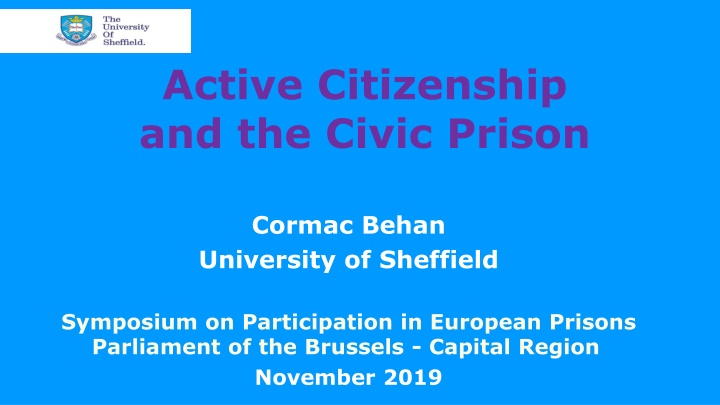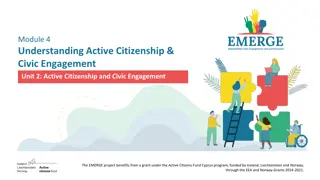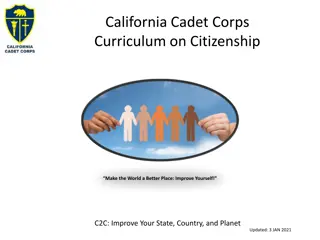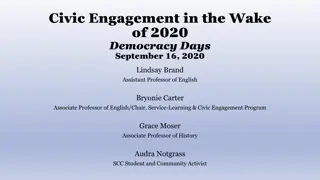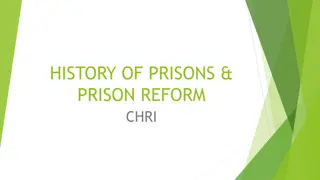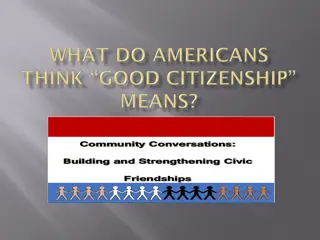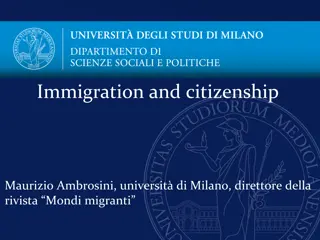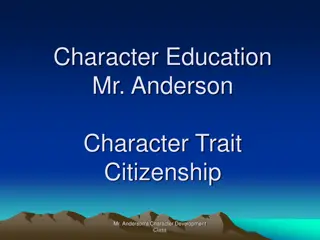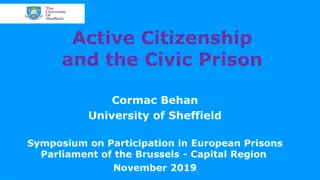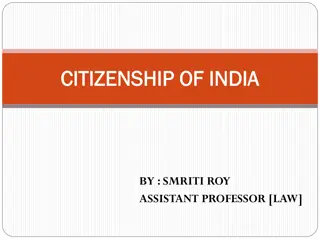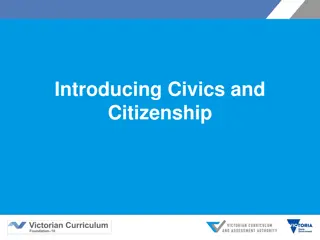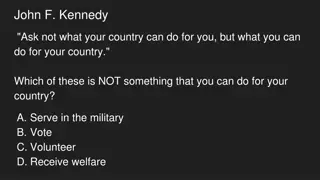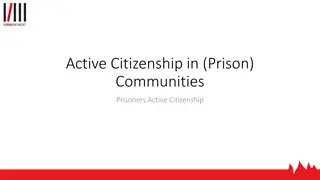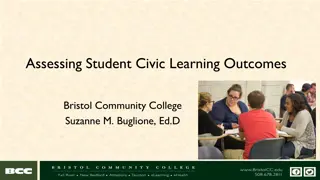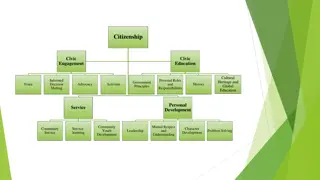Reimagining Citizenship in Prison: Active Civic Engagement and Rights
Explore the intersection of citizenship and incarceration, focusing on the concept of active citizenship within prison settings. Delve into the importance of civic engagement, prisoner rights, and the evolving mosaic of citizenship, highlighting avenues for volunteering, accountability, and reintegration post-release.
Download Presentation

Please find below an Image/Link to download the presentation.
The content on the website is provided AS IS for your information and personal use only. It may not be sold, licensed, or shared on other websites without obtaining consent from the author.If you encounter any issues during the download, it is possible that the publisher has removed the file from their server.
You are allowed to download the files provided on this website for personal or commercial use, subject to the condition that they are used lawfully. All files are the property of their respective owners.
The content on the website is provided AS IS for your information and personal use only. It may not be sold, licensed, or shared on other websites without obtaining consent from the author.
E N D
Presentation Transcript
Active Citizenship and the Civic Prison Cormac Behan University of Sheffield Symposium on Participation in European Prisons Parliament of the Brussels - Capital Region November 2019
Active Citizenship and the Civic Prison Marshall s Citizenship Citizenship as a Mosaic Citizenship and Context Why Active Citizenship Matters? Characteristics of a Civic Prison
Mosaic of Citizenship Marshall s Citizenship (1950) 18thCentury - Civil: Right to justice 19thCentury - Political: Right to participate in political process 20thCentury - Social: Right to live in a society according to prevailing standards Post Marshall 21stCentury Active: Volunteering/Community Participation
Mosaic of Citizenship Political Civil Active Social
Citizenship and Context State Citizenship Structure Society
Citizenship and Context Deprivation of Autonomy (Sykes 1958) Educational Level/Attainment Marginalisation Personal Issues/Challenges Penal Policy and emotional tone Prisoners Rights Conditions of Confinement Prison Rules Institutional Dynamics Educational/Programme Opportunities Post-Release Restrictions
Imprisonment and the Mosaic of Citizenship Civil Citizenship Right to seek redress Political Citizenship Access to the franchise Social Citizenship Prisoner Councils Engagement with Accountability and Monitoring Bodies Active Citizenship Volunteering Charitable Activities
Imprisonment and the Mosaic of Citizenship Civil Citizenship Right to seek redress Limited (Depending on jurisdiction) Political Citizenship Access to the franchise Yes/No (Depending on jurisdiction) Social Citizenship Prisoner Councils Engagement with Accountability and Monitoring Bodies Limited (Depending on jurisdictions) Restricted/Limited (Depending on jurisdiction) Active Citizenship Volunteering Charitable Activities Yes Yes
Why Political Citizenship Matters? Voting is an instructive proxy measure of broader social change. Compared to demographically matched non-voters, voters are more likely to be interested in politics, to give to charity, to volunteer, to serve on juries, to attend community school board meetings, to participate in public demonstrations, and to co-operate with their fellow citizens on community affairs. It is sometimes hard to tell whether voting causes community engagement or vice versa, although some recent evidence suggests that the act of voting itself encourages volunteering and other forms of good citizenship. Putnam (2000: 35)
Why Active Citizenship Matters? People who trust others are all-round good citizens, and those more engaged in community life are more trusting and more trustworthy. disengaged believe themselves to be surrounded by miscreants and feel less constrained to be honest themselves. The causal involvement, reciprocity, honesty and social trust are as tangible as well-tossed spaghetti. Conversely, the civically arrows among civic Putnam (2000: 137)
Why Active Citizenship Matters (in Prison)? Promotes positive relations within prison Endorses policies of Normalization Restorative Rehabilitative Transformative Reintegrative Rebuilds the bonds of Community
Imprisonment and Active Citizenship Italy: Races between prisoner athletes and local residents Belgium: JailTV run by prisoners & university students United Kingdom: Prison Councils Ireland: Red Cross project United Kingdom: Peer to Peer Literacy France: Samaritans Listener scheme The Netherlands: Prisoners/local residents share skills Croatia: Car repair service staffed by serving prisoners
Characteristics of a Civic Prison Rights Political, Social and Civic Emotional Tone of Penal Policy Architecture Communal Space and Place Dynamic Security Time out of cell Complaints and Accountability Mechanisms International Standards/Best Practice Legitimacy Prisoner Confidence Prisoner Councils Solidarity Holistic Prison Education Curriculum Opportunities for Active Citizenship
Participation and Civic Education This is why simply placing civic and citizenship classes at the core of the prison curriculum is not enough. And of course, simply promoting and providing a citizenship forum is not enough either. To make citizenship education more meaningful and educative, to ensure it is a learning process rather than just a learning practice, prison education must be grounded in an ideology that is focused less on enabling prisoners know their place in society and more on enabling them to re- conceptualise their place in society. Costelloe (2014:33)
Conclusion/s Prisoners as part of a community Prisons as a component of wider society Education for Citizenship Citizenship as Education Active Citizenship: Engage, Enable, Empower, Include From Social Contract to Social Compact
Active Citizenship and the Civic Prison Bibliography Behan, C. (2017) Citizen Convicts: Prisoners, Politics and the Vote. Manchester: Manchester University Press. Behan, C. (2014) Learning to Escape: Prison Education, Rehabilitation and the Potential for Transformation. Journal of Prison Education and Re-entry, 1(1): 20-31. Costelloe, A. (2014) Learning for Liberation, Teaching for Transformation: Can Education in Prison Prepare Prisoners for Active Citizenship? 14(1): 30-36. Marshall, T.H. (1950) Citizenship and Social Class and Other Essays. Cambridge: Cambridge University Press. Putnam, R. (2000) Bowling Alone: The Collapse and Revival of American Community. New York: Simon and Shuster. Contact Details Cormac Behan, Centre for Criminological Research, Bartolome House, Winter Street, Sheffield, S6 2WN. Email: : c.m.behan@sheffield.ac.uk
